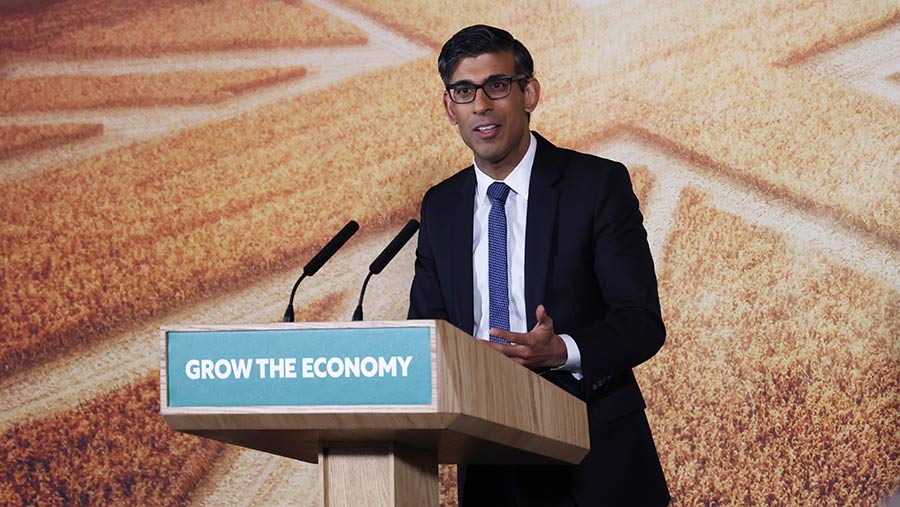Positive reaction to Rishi Sunak’s Food Summit talks
 © Alice Hodgson/No 10 Downing Street
© Alice Hodgson/No 10 Downing Street Participants at the government’s Food Summit have been left feeling positive by the announcements, but insist action must be taken now to ensure policies come to fruition.
Prime minister Rishi Sunak invited delegates from food, farming and retail industries to 10 Downing Street on Tuesday (16 May) for a UK-wide food security summit.
Mr Sunak fulfilled a leadership campaign promise to NFU president Minette Batters last summer that he would host the “farm-to-fork” summit to address food insecurity in Britain.
See also: Rishi Sunak unveils new support package for British farming
The war in Ukraine and trade disruption with the EU since Brexit have contributed to soaring input and energy costs for farmers, sharp food price increases and supply shortages in eggs, tomatoes, cucumbers and peppers.
Ahead of the meeting, the government announced measures to support farmers, including a £30m package for precision-breeding technologies and additional reviews into fairness in the horticulture and egg supply chains.
There is also £2m to boost global trade shows and missions, a £1m programme to support dairy exports and a commitment to protect food and farming standards in the UK under all existing and future trade deals.
For the horticulture sector, the government also pledged to make 45,000 temporary visas available again in 2024 for seasonal workers to come to this country to pick and pack crops.
‘Sense of collaboration’ – Spencer
Defra farming minister Mark Spencer described the atmosphere in the meeting as “surprisingly positive”. He told Farmers Weekly: “There is a huge sense of collaboration and a huge desire to solve the challenges that we face.
“I think it [the summit] was very, very positive. I come away from it feeling quite positive that we can find the solutions together, in terms of government, farmers, processors and retailers to keep the nation fed, improve our environmental footprint, biodiversity and save the planet at the same time.”
Phil Stocker, chief executive of the National Sheep Association, attended the meeting and he agreed it was “positive” – especially to have farming organisations, processors and retailers together.
“Overall, it was positive that it took place and it was positive to hear the government finally give some commitments to farming and food production,” he said.
“Over the years, we have heard so much from government about environmental protections, but they did talk really positively about productive agriculture and farming’s contribution to the economy and the importance of protecting our high standards in trade deals.”
Trade commitment
But Mr Stocker questioned why the government had only now made a cast-iron commitment to protect British farmers in trade deals after signing significant deals with New Zealand and Australia, which have been criticised by former Defra secretary George Eustice.
Regarding the sheep industry, Mr Stocker said the government could do a lot more to promote productive agriculture in the uplands, ensure a network of livestock markets and abattoirs in the future and help farms develop their own independent markets.
Mark Coulman, national chairman of the Tenant Farmers Association (TFA), drew two main messages from the summit.
“First, there is a general feeling of a lack of confidence across the food and farming sector, which is leading to a lack of investment. Confidence needs to be scaled up again,” he said.
“Everyone in the supply chain needs to be persuaded the government has got our backs and consumers understand good work is being done to give us confidence to invest.
“Second, there needs to be more equality of risk throughout the supply chain. Some of the recent food shortages are due to producers thinking there is not enough reward to the risk they are taking to produce these products.”
Trans-Pacific trade
Aled Jones, president of NFU Cymru, said he came out of the meeting feeling more positive than before he went in.
“I’m conscious that what was agreed in the New Zealand and Australian trade deals could be potentially quite damaging for farming in Wales,” he said.
“However, there was a detectable change in the government’s negotiating stance on CPTPP [the Comprehensive and Progressive Agreement for Trans-Pacific Partnership], which was welcome.
“Having access to an additional 500 million population, a growing middle-class economy wishing to purchase high-value food products we produce back in Wales and across the UK could be very welcome going forward.”
Mr Jones was also buoyed by the announcement of an additional five agri-food and drink attaches to be placed in key global markets to help boost UK agri-food trade exports.
But he insisted the UK government must make the Food Summit an annual event to ensure accountability for all partners.
